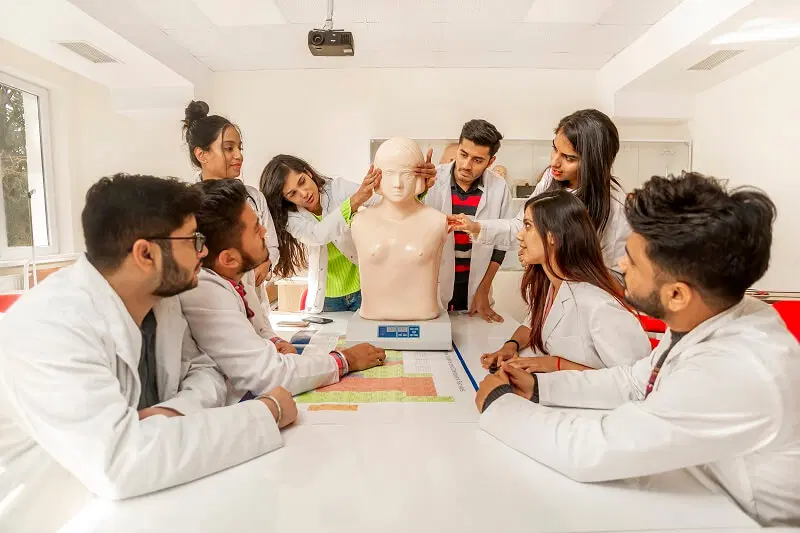Study Medicine In Europe In English
-
Programmes fully taught in English
-
Degrees approved by Medical Councils in the UK, USA, Canada, Australia, Ireland, and worldwide
-
100% guaranteed acceptance into medical school
-
Recognised by the WHO and listed in the World Directory of Medical Schools
-
Affordable tuition fees & cost of living
-
Full ongoing support by doctors and students overseas


Why Pursue Your Medical Education

Globally
Recognised Courses

English
Taught Programs

Flexible
Admission Requirements

Affordable
Tuition Fees, Living Costs

Unlimited
University Applications

Less
Competition For Entry

Modern
Facilities & Technology

Work
Return Home, Start Practicing
Why Study Medicine Abroad in English
Studying medicine abroad expands students’ horizons both in an educational and cultural sense. Furthermore, aspiring doctors acquire self-reliance, discipline, and maturity as part of the process of living in a foreign country. Consequently, international students gain a competitive edge in the job market thanks to their distinct backgrounds and skill sets.
For the past 20 years, it has become increasingly popular for aspiring doctors to study medicine in Europe in English. For some, the reason behind the life-changing decision to study medicine abroad is the highly competitive admission requirements in their home countries. Other applicants meet the entry criteria but are forced to seek medical education in Europe because it’s more affordable.
Whatever your case may be, studying medicine in Europe should not be looked down upon or considered an alternative career pathway. The truth is that medical schools overseas offer the same high quality of education and facilities and are recognized by health organisations worldwide. This means that you will be eligible to work as a doctor anywhere in the world.
What Are the Entry Requirements to Study Medicine in Europe?
The European universities that teach medicine in English are located in over 40 countries. Each of these universities has its own unique set of entry requirements. The only criterion of acceptance they all share is English language proficiency.
Other than that, you may have to sit an entrance exam in Biology, Chemistry, Physics, or Mathematics. Some exams will be simple multiple-choice questions, while others can be open questions or a combination of both. They may or may not take your high-school science subjects grades into consideration.
There are hundreds of medical universities abroad so entry requirements will always vary. The most common entry requirements for medicine in Europe are:
- BTEC, GCSE, or equivalent high school diploma
- Satisfactory grades in Chemistry, Biology, Maths, and Physics
- English language proficiency
- Entrance exams in Biology, Chemistry, and English (options for online testing)
- A simple online interview to check your motivation for choosing your vocation
- Letter of recommendation or personal statement (optional)
- You must have a passport
- Admission fees can range from €20 to €200 and above
- Some universities require entry fees upon acceptance to make sure the seat will be taken
How Much Does It Cost to Study Medicine in Europe?
- Depending on which country you choose to study medicine abroad, annual tuition fees can range from €3,000 to €30,000. These prices depend solely on the economic state of the corresponding country. More expensive options don’t mean better quality of education because medicine is taught and learned the same everywhere.
Here are the general guidelines for the cost of studying medicine in Europe:
- Georgia and Serbia are the most preferred and affordable options, with tuition fees starting from € 4400 per year.
- In the middle, Romania, Bulgaria, Poland, and other countries from Central and Eastern Europe have annual costs of € 4950 – € 15000.
- Italy, Turkey, Cyprus, and Germany fall into the higher price range of € 4400 and above per year.
Meanwhile, here are the Top 5 universities to study medicine abroad at a low cost:
- GEORGIA: EAST EUROPEAN UNIVERSITY – 5000 USD
- UKRAINE: VINNYTSIA NATIONAL MEDICAL UNIVERSITY – 5000 USD
- RUSSIA: KURSK STATE MEDICAL UNIVERSITY – 5500 USD
- SERBIA: UNIVERSITY OF NOVI SAD – 6500 EURO
- AZERBAIJAN: AZERBAIJAN MEDICAL UNIVERSITY – 5500 USD
- MOLDOVA: The State University of Medicine and Pharmacy Nicolae Testemitanu fees – 5000 EURO
Where Are the Medical Degrees Recognised?
All of our partner universities are recognised by the World Health Organisation and listed in the World Directory of Medical Schools.
The medical degree you obtain from a European school will be recognised worldwide. All universities comply with the highest quality of educational standards set by medical councils and organisations worldwide. You can immediately start practising as a doctor upon graduation.
The General Medical Council in the UK and the Irish Medical Council require international graduates to have at least 5,500 contact clock hours of study over a period of at least 3 or 4 years. Every medical school overseas meets these criteria and provides the necessary experience and knowledge for you to qualify as a Doctor. All you have to do to gain a doctor’s licence back home is to pass the PLAB/UKMLA exam, which you will already be prepared for.
Your qualification must be from a university listed on the World Directory of Medical Schools to be eligible for licensing and residency in the US, Canada, and Australia as an international graduate. European medical schools already meet this requirement. You will be eligible to take the USMLE for the USA, the MCCQE for Canada, and the AMC clinical examination for Australia.

Frequently Asked Questions
There are more than 100 medical universities in Europe where you can study Medicine, Dentistry, Veterinary, and Pharmacy.
Absolutely, yes! There are more than 100 European universities that teach medicine in English. To learn more about them, check out the list that we created. It contains top medical schools in Europe that offer medicine, dentistry, pharmacy, and veterinary courses in English.
Entry requirements for medical school vary highly depending on different universities. Some medical universities in Europe have entrance exams in Biology, Chemistry, and English others don’t. However, for sure, you will need:
- High school diploma or an equivalent credential in your home country’s high-school system
- Good grades in Chemistry and Biology and/or Math and Physics
- Passport
Tuition fees vary considerably depending on the university. For example, European University In Tbilisi Georgia charges just around € 4400per year, while the tuition fees at Acibadem University in Turkey are € 24600 per year.
Medical education in Europe is 6 years.
Yes, but it’s not just okay. It’s a perfect opportunity! Suppose you choose to study medicine in Europe. In that case, you will benefit from affordable tuition fees and living costs, flexible entry requirements, high-quality education, modern medical facilities, and a globally recognised degree.